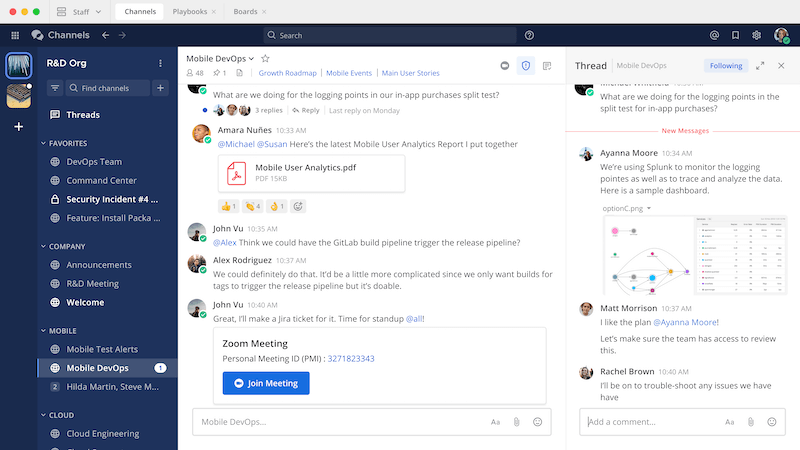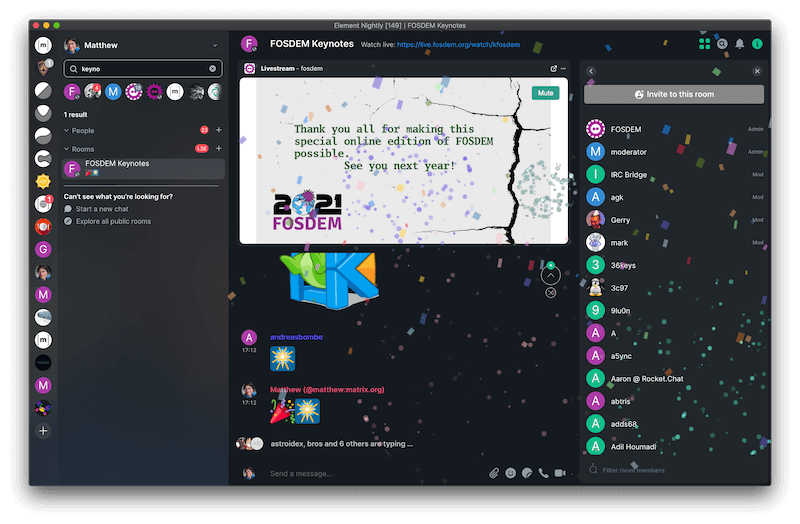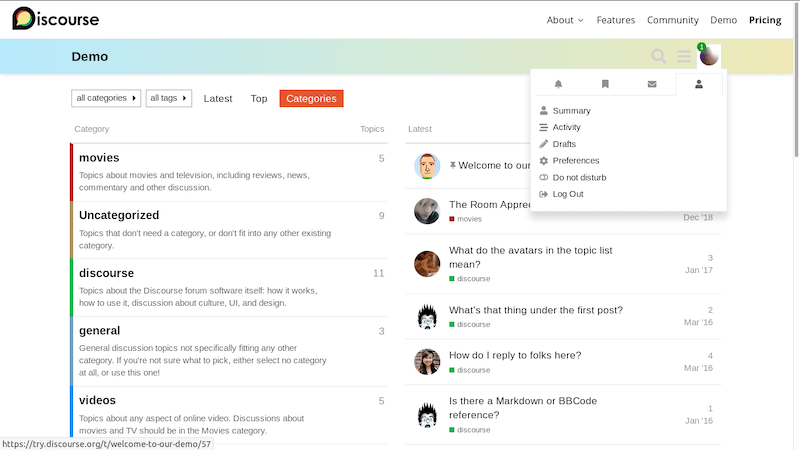Slack has revolutionized team communication, offering a centralized platform for messaging, collaboration, and file sharing. It’s an indispensable tool for many teams, but the cloud-based nature of Slack may not be suitable for everyone. Concerns over privacy, security, control, and vendor lock-in have driven teams to seek out options to self host Slack or use self-hosted alternatives. Self-hosting offers the ability to have complete control over data, the potential for significant cost savings, and the ability to customize the platform to meet specific needs. This article will explore the best ways to self host Slack and other self-hosted alternatives, highlighting their key features, benefits, potential drawbacks, and providing guidance on how to get started.
Why Choose a Self-Hosted Slack Alternative?
Self-hosting a communication platform gives you complete control over your team’s communications. While Slack offers many convenient features, self-hosting alternatives come with their own set of unique benefits:
Control over Data and Privacy Concerns
In today’s data-driven world, privacy is more important than ever. Self-hosting means you control the servers and infrastructure where your communication data is stored, giving you peace of mind that your sensitive information is not stored in the cloud, vulnerable to breaches. Additionally, data regulations such as GDPR or HIPAA may require you to maintain tight control over where your data resides. Self-hosting ensures compliance with such standards, enabling you to securely manage your team’s data without outsourcing responsibility.
Cost Savings
Many companies, particularly small and medium-sized enterprises (SMEs), find that cloud-hosted services like Slack can quickly become costly, especially when scaling up. Slack charges on a per-user basis, which means as your team grows, so do your expenses. With self-hosting, you’re usually dealing with fixed costs—mainly the cost of hosting, server resources, and maintenance—which are often more economical in the long run, especially for larger teams.
Customization
Self-hosted platforms offer a level of customization that cloud-based platforms like Slack simply can’t match. You can tailor everything from the appearance and branding to integrations and workflows, aligning the communication tool exactly with your team’s needs. Additionally, being able to modify the source code opens the door to creating features that are unique to your company, giving you complete flexibility.
Avoid Vendor Lock-In
With SaaS solutions, you’re tied to the provider’s features, updates, pricing structure, and policies. With slack self hosting, you ensure you’re free from vendor lock-in and gain full control over your software environment. You can easily migrate to other systems or upgrade without worrying about a third-party vendor’s decisions or price hikes.
Compliance with Regulations
Many industries have strict regulations regarding data storage, security, and communication. Healthcare companies need to comply with HIPAA, while businesses in the EU must adhere to GDPR. By self-hosting your communication platform, you can design your system to comply with these specific requirements, ensuring your team’s data is always handled responsibly.
Key Features to Look for in a Self-Hosted Communication Tool
When evaluating slack self hosting alternatives, it’s important to prioritize tools with key features that will support your team’s communication needs. These features include:
Real-time Messaging and Channels
Real-time messaging is at the core of any communication tool. A self-hosted platform should allow teams to engage in instant messaging, organize conversations into channels based on topics, and enable direct messaging between team members.
File Sharing and Integrations
In a professional environment, the ability to share files and collaborate on documents is essential. Look for platforms that allow seamless file sharing and integrations with tools such as Google Drive, GitHub, or project management software like Jira.
Video and Voice Calling
Video and voice calling are integral for remote teams, and many self-hosted Slack alternatives now include these capabilities. This feature enables teams to have face-to-face meetings or quick voice calls without relying on third-party services.
Searchable Archives
As conversations grow, it becomes essential to have a robust search function to find important messages, files, and discussions. A self-hosted solution should offer an intuitive and fast search feature to retrieve old messages and shared files quickly.
Mobile and Desktop Apps
A modern team relies on mobility. A self-hosted communication platform should offer apps for both mobile devices (iOS/Android) and desktop (Windows, macOS, Linux), ensuring that communication continues smoothly, whether in the office or on the go.
Customizability
Customization options are a key advantage of self-hosted platforms. Look for a tool that lets you brand the platform with your team’s logo, adjust settings to fit your workflows, and extend its functionality with third-party integrations.
Security and Encryption
With self-hosting, security becomes your responsibility. Ensure the platform you choose supports end-to-end encryption, secure authentication, and permission management to prevent unauthorized access and protect sensitive conversations.
Top Self-Hosted Slack Alternatives
Now, let’s dive into the top self-hosted Slack alternatives. We’ll cover their main features, pros, cons, and what type of teams they’re best suited for.
Mattermost

Mattermost is one of the leading self-hosted alternatives to Slack. It offers a feature-rich, open-source platform designed to help teams stay connected and collaborate seamlessly.
Key Features
Mattermost allows real-time messaging, threaded conversations, file sharing, and integrates with popular services like GitHub, Jenkins, and Jira. It also includes voice and video calling, direct messages, and customizable notification settings.
Pros
- Fully open-source and customizable.
- Strong focus on security, with support for enterprise-grade encryption.
- Extensive integrations and plugins.
- Scalable for both small and large teams.
Cons
- Setup can be complex, especially for smaller teams without dedicated IT resources.
- Requires server maintenance and updates, which can take time and effort.
Rocket.Chat

Rocket.Chat is another popular open-source messaging platform. It’s known for its easy-to-use interface and strong real-time communication capabilities, making it a great alternative for Slack.
Key Features
Rocket.Chat supports group chats, direct messaging, file sharing, voice/video calls, and extensive integrations. It also offers a wide range of customization options, including custom bots and workflows.
Pros
- Easy to install and configure.
- Real-time messaging and seamless media sharing.
- Customization options for bots, workflows, and integrations.
- Active open-source community with regular updates.
Cons
- The user interface can feel a bit cluttered for newcomers.
- Some advanced features, like video calling, require additional configuration or third-party integrations.
Zulip

Zulip offers a unique approach to team communication by focusing on threaded conversations. This is ideal for teams that want to organize discussions more effectively.
Key Features
Zulip allows threaded messaging, which organizes conversations into topics and sub-topics. It includes real-time messaging, powerful search functionality, and integrations with popular apps like GitHub, Google Drive, and Jira.
Pros
- Efficient conversation management with threaded topics.
- Powerful search and filtering options.
- Ideal for teams with a lot of ongoing, asynchronous conversations.
- Open-source and highly customizable.
Cons
- The user interface can be a bit overwhelming for new users.
- Not as intuitive as Slack for teams that prefer a more traditional chat experience.
Matrix (with Element)

Matrix is a decentralized communication protocol that aims to give users complete control over their messaging data. The Element client is the most widely used interface for Matrix.
Key Features
Matrix offers end-to-end encryption, decentralized message storage, and real-time communication. Element, the most popular client, supports text chat, voice/video calls, and integrations with other tools.
Pros
- True decentralization, allowing teams to host their own servers and control their data.
- Strong security with end-to-end encryption.
- Scalability, making it suitable for large teams.
- Open-source and customizable.
Cons
- The setup process is more complex than traditional self-hosted platforms.
- User experience may not be as polished as other tools, especially for newcomers.
Discourse (for Asynchronous Communication)

While not a real-time messaging platform like Slack, Discourse offers powerful asynchronous communication. It’s great for teams that focus on knowledge sharing and discussions rather than real-time messaging.
Key Feature
Discourse supports threads, categories, notifications, and tagging, allowing teams to organize conversations efficiently. It is optimized for discussion boards and can serve as a central knowledge base.
Pros
- Simple to set up and easy to manage.
- Great for teams that focus on knowledge-sharing and long-term discussions.
- Light server requirements, making it ideal for smaller teams.
Cons
- Not designed for real-time communication, so not suitable for teams that need instant messaging.
- Lacks the direct messaging and video call features that other platforms provide.
How to Set Up Your Self-Hosted Slack Alternative
Setting up a self-hosted solution is a step-by-step process that requires careful planning. Here’s how you can get started:
- Choose Your Server:
You’ll need a server to host your communication platform. For this, VPS.us offers affordable and reliable VPS hosting options that give you the flexibility to scale your resources as your team grows. - Install the Software:
Many self-hosted platforms come with easy-to-follow installation guides. Most platforms support Docker, which makes the installation process even simpler. Ensure your server meets the software’s system requirements. - Configure Security Settings:
Once the platform is installed, configure essential security features. This includes setting up firewalls, SSL certificates for secure communication, and ensuring that user roles and permissions are correctly set. - Add Users and Customization:
Add your team members, assign them roles (admin, user, etc.), and set up your preferred channels, groups, and integrations. Don’t forget to brand the platform according to your company’s look and feel.
Security Considerations for Self-Hosting

Self-hosting means you’re in charge of your system’s security. Here are the key measures you should take:
- Encryption:
Make sure your platform supports encryption both at rest and in transit. Use SSL certificates for secure communication and ensure that files and messages are encrypted. - Firewall and Access Control:
Implement strict firewall rules to limit access to your servers. Consider using VPNs for team members working remotely. - Authentication:
Use multi-factor authentication (MFA) for additional security. Enable strong password policies and encourage employees to use password managers. - Regular Backups:
Set up automated backups to ensure that your data is safe in case of hardware failure or other issues.
Maintaining and Scaling Your Self-Hosted Solution
As your team grows, it’s important to maintain and scale your self-hosted communication tool:
- Monitor Performance:
Keep track of your server’s performance using monitoring tools. This helps you identify potential bottlenecks or issues before they affect your team. - Scalability:
As your team expands, you’ll need to scale your infrastructure. Many self-hosted platforms allow you to add more resources as your needs increase. - Update Regularly:
Stay on top of updates to the platform. Regular updates ensure that your system remains secure and up-to-date with new features.
Cost Comparison: Self-Hosted vs. Cloud-Hosted
While self-hosting requires upfront setup costs (servers, hosting plans, maintenance), it’s generally more cost-effective in the long run compared to cloud-hosted platforms. Cloud services like Slack may be cheaper for small teams but can become expensive as your team grows. Self-hosting offers predictable, fixed costs, making it a more budget-friendly option for large teams.
Conclusion
Self-hosting your team’s communication platform provides numerous benefits, including greater control, cost savings, and enhanced privacy. Whether you’re looking for a flexible, open-source platform like Mattermost or Rocket.Chat, or a more specialized tool like Zulip or Discourse, the right solution depends on your team’s size and needs. By considering the features, customization options, and security requirements, you can find a Slack alternative that meets your requirements.
Power Up Your Team Communication with VPS Hosting
If you’re ready to take full control of your team’s communication, start by choosing a reliable server from VPS.us. Our KVM2-US plan, featuring 2 vCPU cores, 2 GB of RAM, and 25 GB of SSD storage, provides the perfect foundation for hosting your self-hosted Slack alternative. With VPS.us, you’ll get flexibility, security, and the scalability you need to grow without worrying about



